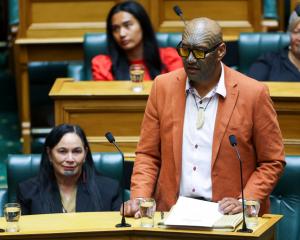Long-suffering Canterbury residents were rocked by another shock this week with the revelation data used by the Ministry of Education to determine the fate of the region's schools is flawed.
The Government's proposal to close 13 schools, merge 18 into nine and relocate seven has upset boards of trustees, teaching staff, parents and children throughout the region and mobilised thousands into protest action.
But the admission by Minister of Education Hekia Parata there are inaccuracies in some of the data collected - on school building earthquake damage, the state of school land, and school rolls - has rubbed further salt in the still raw wounds of the past two years.
Major inaccuracies in the data include Christchurch's Burnside Primary School being listed as having 50 earthquake-damaged buildings, despite it only having five buildings. Other schools claim similar building number errors, which mean figures quoted to repair them are grossly inflated.
And some schools say March enrolment figures were used, despite pupil numbers increasing at some schools - in some cases considerably. A reported 22 affected schools believe data regarding them is incorrect.
Ms Parata says she will ensure the data is correct before consultation with schools begins.
Ministry chief executive Lesley Longstone said: "That's why we provided the data, so we can all look at it together and, if there are issues, we will work them through with individual schools and this is absolutely genuine consultation." The first round of consultation ends on December 7 (the ministry will release its decision in February and schools will have a month to respond further) but critics claim the consultation is far from genuine and decisions have been predetermined.
When the proposals were announced last month, there were claims they were part of a wider strategy to close intermediates and a prelude to introducing charter schools (already a controversial subject in its own right).
Closing schools is always a touchy subject and the Government in this instance was always on a hiding to nothing. Schools are seen by many as the backbone of a community. They often have long and proud legacies and family connections for many. But with declining birth rates, mobile populations, increasing urbanisation and pressures on government spending, closures and mergers are a reality - as Dunedin has learnt in recent years.
Clearly, there is a need to make decisions about the future of education in Canterbury. A reported 4500 children have moved out of the region post-quakes, some school land and buildings are unsafe, and education is only one of many areas budgeted for in the estimated $30 billion rebuilding of Christchurch.
Prime Minister John Key has said the Government is "building a Christchurch which is going to address all of the demands for the future" and it is necessary to look ahead.
But, in looking ahead, it is vital to remember Canterbury people are still vulnerable - and still living with the legacies of the recent past, grieving for the loss of family and friends, homes, businesses, livelihoods - and their city.
Given this, it is clear Ms Parata has handled the situation badly from the beginning. She was vague in Parliament about who she consulted before she made announcements about the proposed mergers and closures. The announcement itself was a debacle, with many affected staff hearing about the proposals from the media, which was sent information (admittedly under embargo) before staff were told themselves. The proposals - even if they all prove necessary - are drastic and, out of fairness, respect and sensitivity, should have been discussed with affected parties first.
The ongoing saga is clearly taking its toll. Burnside Primary principal Matt Bateman said the misinformation "really hurt us" and claimed the situation had further traumatised children who were already receiving counselling after the earthquakes.
For that reason, it has been unsettling to see young children being used as mouthpieces at rallies. While the concerns directly affect them, they should be sheltered as much as possible by everyone - parents, school staff and the Government - while the proposals and inevitable changes are discussed and carried out in a thoughtful, careful way.












